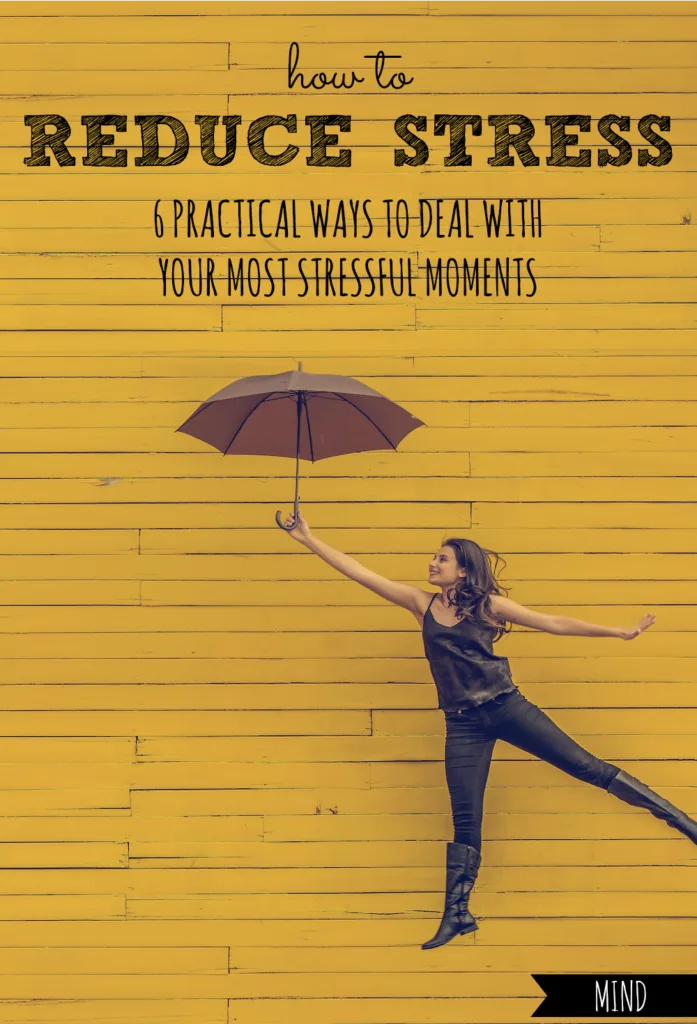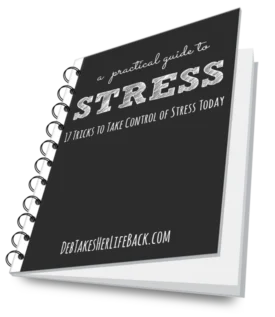Most of us need to learn how to reduce stress.
Are you desparately wondering how to reduce stress? You’re not alone!
Did you know that 75% of adults reported experiencing moderate to high levels of stress in the last month? Seventy-seven percent of them report regularly experiencing physical symptoms caused by stress, like headaches, upset stomach, chest pain, insomnia, and frequent sickness.
Seventy-three percent regularly experience psychological symptoms. These include anxiety, moodiness, loneliness, depression, and feeling overwhelmed.
There are so many outstanding resources on stress management that I just couldn’t fit them all into one post. So today, we’re focusing on how to reduce stress with some simple, short-term fixes. These are techniques that you can use in the heat of the moment when your coworker messes up another project, you’ve exchanged some angry words with a family member, or you find that your toddler used her crayons to spruce up your vase…not that that’s happened to me…ahem.

At the end of this post, you’ll find a link where you can sign up to receive A Practical Guide to Stress | 17 Tricks to Take Control of Stress Today. It delivers lots more fantastic information on stress and stress management, including causes, short- and long-term solutions, and how to develop a low-stress mindset. It’s all of the really helpful information that I couldn’t squeeze into this post, so check it out!
But first things first! Doctors, psychologists, researchers, and the internet provide thousands of simple, short-term solutions to stress. Because I don’t want to overwhelm you with options, I’m providing the top six most commonly suggested techniques.
Utilize breathing exercises.
When you breathe deeply, it sends a message to your brain to calm down, which in turn relays the message to your body. Deep breathing has been shown to decrease heart rate and lower blood pressure. Bonus: focusing on your breathing tends to avert your thoughts from your stressors.
So how do you do it? If you’re able to move around, try inhaling as you take four steps, and then exhaling for the next four steps. Walk around with focused and controlled breathing for at least three minutes, longer if possible. Slowly work your way up to 6-8 steps per inhale and exhale.
Need to stay seated? Watch a clock to inhale for 3 seconds, then exhale for 3 seconds, for at least three minutes.
Listen to nature sounds.
Sitting quietly and listening to the sounds of natural landscapes for 1-3 minutes has been shown to stop the production of stress hormones. YouTube is full of these types of videos, or you could download an app like Relax Melodies or Naturespace for iOS or Nature Sounds or Nature Sounds Relax and Sleep for Android.
Listen to music.
Just not a nature sounds kind of person? Listening to music can slow your heart rate and decrease blood pressure and stress hormone levels. Music is also a wonderful tool for diverting our attention from our stressors.
Classical music is always most highly recommended. I’m not usually a huge fan of classical music, but I can’t say no to Clair de Lune. Also, not a classical song, but I probably played Moon River over 1000 times in my dorm room my freshman year of college. It was just so calming and comforting as I studied for anatomy exams on two hours of sleep.
Outside of classical music, gentle music with a familiar melody is generally most comforting. But any music that produces a sense of calm and centeredness for you is the right music for stress relief.
Exercise.
Physical activity produces endorphins, your body’s natural “feel good” chemicals. Endorphins have a lot in common with anti-anxiety prescription drugs, without any of the side effects.
You can kick them into action with a walk around the neighborhood, a dance party in your living room, or a sweat sesh at the gym. Exercise can be a one-time stress reliever for a particularly stressful event or can help to regularly keep stress at bay if incorporated into your daily or weekly routine.
Need help deciding which type of exercise you can stick with for the long haul? Check out How to Find a Workout You Can Stick With | The 5 Questions You Have to Ask.
Pray.
It’s hard for me to stay stressed out after I bring my stress to God in prayer. It reminds me that my current situation is temporary, and to trust God in all things.
Philippians 4.6-7 (MSG) says, “Don’t fret or worry. Instead of worrying, pray. Let petitions and praises shape your worries into prayers, letting God know your concerns. Before you know it, a sense of God’s wholeness, everything coming together for good, will come and settle you down.”
Meditate.
Meditation has been shown to offer both physical and emotional benefits. It can lower blood pressure and heart rate, improve blood circulation, lessen stress, and increase feelings of relaxation.
Meditation can also help to manage symptoms of anxiety, depression, sleep problems, tension headaches, and more. You can find a beginner’s guide to different kinds of meditation and how to get started here.

How will you start to reduce stress today?
Before you allow stressful situations to dig in with physical or psychological side effects, try one of these proven short-term resolutions to lower your heart rate, blood pressure, and stress hormone levels, and to divert your attention from your stressors. Use breathing exercises, listen to nature sounds or music, exercise, pray, or meditate.
Of course, the problem with short-term solutions is that they treat the symptoms rather than the underlying cause of stress. Wondering how to reduce stress permanently? There’s not enough room in one post!
Sign up here to have A Practical Guide to Stress | 17 Tricks to Take Control of Stress Today delivered straight to your inbox for free. It dives deeper into causes of stress, long-term solutions, and how to develop and nurture a more calm and even-keeled mindset.
Fill your toolbox with several different solutions and you’ll be ready the next time you find yourself facing a stressful situation. You’ll know how to reduce stress and how to effectively implement that knowledge!
Have you found any other short-term resolutions to stress that we didn’t mention above? Share them in the comments below!

P.S. Ready to break up with stress? Our free guide is chock-full of crucial info and practical tips, plus links to helpful apps, posts, and other fantastic resources! Download it here today!
Disclosure: While all opinions are our own, we are a participant in the Amazon Services LLC Associates Program and other affiliate advertising programs, designed to provide a means for us to earn fees by linking to Amazon.com and affiliated sites, at no additional cost to you.


